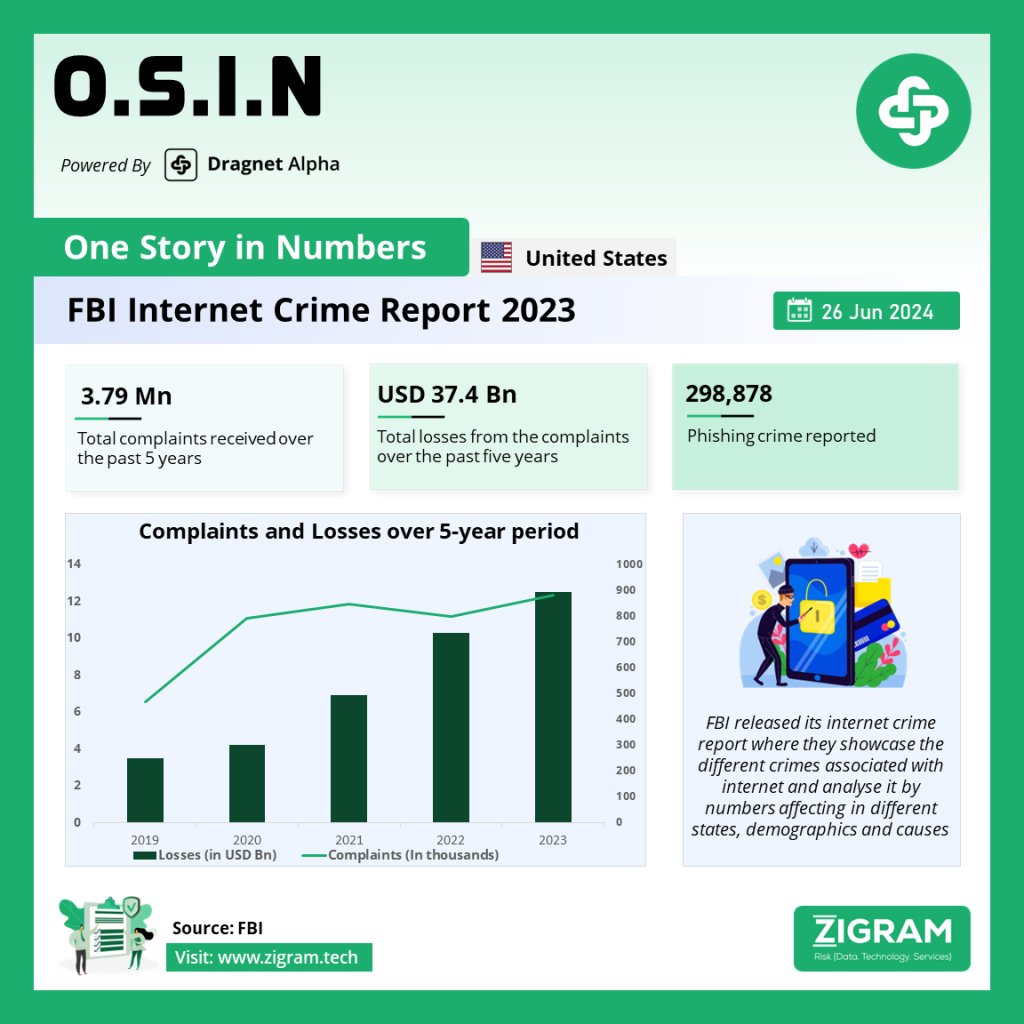In today’s interconnected world, the cyber landscape is fraught with dangers posed by a variety of malicious actors. The FBI recently released its Internet Crime Report 2023 where they analyze the cybercrimes reported by the victims. These adversaries, equipped with sophisticated tools, are capable of executing large-scale fraud schemes, holding sensitive data and finances hostage, and threatening national security. Both profit-driven cybercriminals and nation-state adversaries possess the capability to disrupt critical infrastructures, including school systems, police departments, healthcare facilities, and private sector entities. To counter these threats, the FBI has developed a multifaceted strategy that emphasizes collaboration with the private sector, removing threats from U.S. networks, unmasking anonymous actors, and targeting cybercriminals’ financial assets, including virtual currencies.
The Role of the Internet Crime Complaint Center (IC3)
Central to the FBI’s efforts in combating cybercrime is the Internet Crime Complaint Center (IC3). IC3 provides the public with a direct channel to report cybercrimes to the FBI, enabling the collection of valuable data, the advancement of investigations, and the identification of evolving threats. In 2023, IC3 received a record-breaking 880,418 complaints, with potential losses surpassing $12.5 billion. This represents a nearly 10% increase in complaints and a 22% increase in reported losses compared to 2022. However, these figures likely underestimate the true scale of cybercrime, as evidenced by the FBI’s infiltration of the Hive ransomware group’s infrastructure, which revealed that only about 20% of Hive’s victims reported their incidents to law enforcement. Increased victim reporting would provide the FBI with deeper insights and a greater ability to combat cyber threats.
Types of Cybercrime and Their Impact
Investment fraud emerged as the most financially damaging type of cybercrime tracked by IC3 in 2023, with losses escalating from $3.31 billion in 2022 to $4.57 billion in 2023—a 38% increase. Business email compromise (BEC) followed, with 21,489 complaints resulting in $2.9 billion in reported losses. Tech support scams were the third most costly crime. Different age groups were affected differently by these scams; individuals aged 30 to 49 were the most likely to fall victim to investment fraud, while older adults suffered the majority of losses from tech support scams.
Ransomware incidents also saw a resurgence in 2023, with over 2,825 complaints marking an 18% increase from 2022. Reported losses soared by 74%, from $34.3 million to $59.6 million. Cybercriminals continue to evolve their tactics, employing multiple ransomware variants against single victims and utilizing data-destruction tactics to pressure victims into paying ransoms.
FBI Initiatives and Successes
The FBI’s commitment to assisting cybercrime victims and building partnerships has led to notable successes. The IC3’s Recovery Asset Team (RAT), established in 2018, plays a crucial role in freezing funds for victims by facilitating communication between financial institutions and FBI field offices. In 2023, IC3’s RAT initiated the Financial Fraud Kill Chain (FFKC) on 3,008 incidents, involving potential losses of $758.05 million. Through these efforts, $538.39 million was successfully held, achieving a 71% success rate.
Importance of Public Reporting and Collaboration
The FBI emphasizes the importance of public reporting to IC3. Information provided by the public is vital for advancing investigations, sharing intelligence with partners, and protecting fellow citizens. Cybersecurity is a collective effort, and the FBI is dedicated to fostering a secure digital environment. By working together with the American public, the FBI aims to defeat cyber adversaries and bring criminals to justice.
IC3: A Pillar of the FBI’s Cybersecurity Efforts
The IC3 serves as a critical component of the FBI’s intelligence-driven, threat-focused approach to national security. Established in May 2000, IC3 receives complaints spanning a wide range of cybercrimes, including online fraud, intellectual property rights violations, computer intrusions, economic espionage, online extortion, international money laundering, and identity theft. Since its inception, IC3 has received over eight million complaints. Its mission is to provide a reliable reporting mechanism for suspected cyber-enabled criminal activity and to build effective alliances with law enforcement and industry partners.
The data collected by IC3 is invaluable. It allows the FBI to connect complaints, investigate crimes, track trends and threats, and, in some cases, freeze stolen funds. IC3 also shares crime reports with a network of FBI field offices and law enforcement partners, enhancing the nation’s collective response to cyber threats. To raise public awareness, IC3 produces annual reports on cybercrime trends and routinely provides intelligence reports.
In conclusion, the cyber threat landscape is constantly evolving, with cybercriminals and nation-state actors posing significant risks to individuals and institutions alike. The FBI, through IC3 and other initiatives, remains vigilant in combating these threats. By fostering public reporting and collaboration, the FBI aims to create a more secure digital environment and bring cybercriminals to justice.
Download the full report here.
- #CyberSecurity
- #FBI
- #CyberCrime
- #IC3
- #Ransomware
- #InvestmentFraud
- #BusinessEmailCompromise
- #TechSupportScams
- #DigitalSafety
- #CyberThreats
- #OnlineFraud
- #CyberDefense
- #PublicSafety
- #DataProtection
- #CyberAwareness

